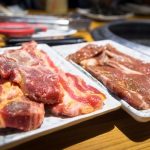
The consumer dairy business, whose brands include Dairyworks, Rolling Meadow and Alpine, was bought by NZX-listed Synlait Milk for $112 million in October 2019, and is looking to take advantage of the manufacturer’s connections and know-how to help achieve its aim of doubling its business over the next three years, by expanding its product range here and overseas.
“We have some pretty big aspirations,” says chief executive Tim Carter.
Health and wellbeing is a major consumer trend, particular after Covid-19, with anything whole food, plant-based or organic growing at a rapid rate, he says.
“We are seriously looking at collagen,” he says. “Collagen is a big trend.”
Celebrity Khloe Kardashian has just partnered with United States collagen supplement company Dose & Co and is the firm’s global spokesperson, espousing the benefits of sprinkling pure collagen powder on her daily coffee when the product launched in October.
Here in New Zealand, premium dairy company Lewis Road released a collagen-infused milk earlier this year, and Hawke’s Bay company Adashiko has just launched a Collagen Refresh premium bottled water this month.
Dairyworks is “seriously looking” at a yoghurt product which includes collagen to meet demand for foods that improve wellbeing, with potential benefits to the gut, bones, and immunity, Carter says.
“I think it’s probably a natural race for the dairy companies to be in there with collagen,” he says.
Dairyworks is agile and could get a collagen product to market in 12 to 16 weeks, compared with a big organisation that might take 12 to 18 months, he says.
However, claims around the benefits of collagen in food are controversial.
The Ministry of Health’s advice service, Healthline, says collagen is one of the major building blocks of bones, skin, muscles, tendons and ligaments, and is the “glue” that holds all these things together. While there aren’t many studies on collagen supplements, those that exist show they may help improve skin texture and muscle mass, as well as reduce osteoarthritis pain, it says.
Lewis Road has copped some flak for its collagen milk, which was named among the “winners” at Consumer’s 2020 Bad Taste Awards.
Lewis Road initially claimed on its website collagen was “scientifically shown to regenerate joint cartilage”.
Consumer said evidence for collagen supplementation was far from conclusive and its claims were not approved under the Food Standards Code.
Lewis Road has since dropped the claims and apologised, saying a staff member “published the statement in error”.
Dairyworks is looking into the claims around collagen as part of its scope and would be careful what it said in its marketing, Carter says.
Still, he says there is a “feel good” factor to the product.
“For whatever reason, consumers think there’s something in it,” he says.
It was similar to claims around the benefits from consuming milk which only has the A2 protein, even though the claims were not proven, he says.
“If it’s about wellbeing and it’s probably more than a chance that it’s doing better for me, then why wouldn’t you?” he says.
Dairyworks is also actively considering plant-based products, consistent with Synlait’s strategy to do milk differently.
“Everyone used to be bovine,” says Carter. “But nowadays, people flex. They might have oat-based, they might have soy, and they could have dairy all in a day. It’s a trend that will last, so that’s a trend that we want to be in.”
Dairyworks is engaging with partners and is planning to have products on the shelf in the first half of this year, with potential across cheese, yoghurts and milk, he says.
The company has already had success with other new products as time-pressured Kiwis branch out from their traditional purchase of a one kilo block of cheese and add more convenience foods to the shopping trolley.
Sales of its cheese slices were growing 16 per cent a year, outpacing the 2 to 4 per cent growth in the general cheese category. Its high-protein yoghurt, which includes a layer of fruit and a muesli topping, launched in October, is outpacing expectations with production stepped up to four times a week from twice a week.
“The demand is there,” Carter says. “If you can meet consumer need, they’ll fly off the shelf.”
Dairyworks has benefited from people spending more on speciality cheeses and butters since Covid as they increasingly dined at home and were looking for culinary inspiration.
Sales of fresh cheeses like halloumi were growing 12 per cent a year, while parmesan and mozzarella were increasing by about 10 per cent.
“People are treating themselves and probably also making special meals in the weekends,” he says.
The company launched flavoured butters in Australia through Woolworths last July, and in New Zealand in September, to capitalise on the demand for culinary inspiration.
Carter expects the trend to continue for the next couple of years.
Growth in the company’s retail grocery business during Covid has offset a drop off in food service sales, he says.
As well as expanding its range of products, Dairyworks, which sells its products in 16 markets, is targeting New Zealand, Australia, the Pacific and China for further growth.
The company expanded to Australia 18 months ago and the country now makes up about 10 per cent of its business, but it’s growing at a rapid rate of 300 per cent.
It has just reached a distribution agreement for the Pacific Islands, which should accelerate growth in that market.
In China, where it sells smaller-sized convenience and snack foods, it’s looking to move from a distribution agreement to a partnership to grow the business at a far faster rate this year.
Right now, though, Dairyworks is gearing up for the busy summer season, with 30 per cent of its speciality cheese volume typically sold during December and January when there is a lot of entertaining.

























